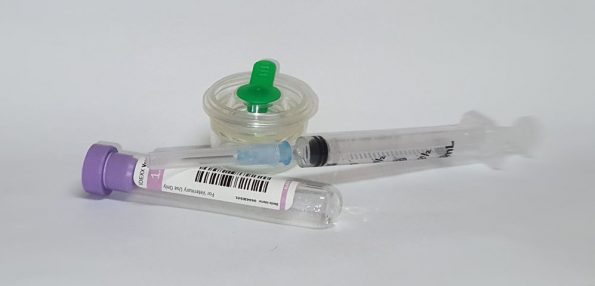
At the time of admission for any anaesthesia or sedation for your pet you will often be asked if you would like a pre-anaesthetic blood profile to be run. What is this? Why do I need it?
Pre-anaesthetic blood testing which is often (and best) performed on the same day as a procedure involves a blood sample of approximately 2 ml of blood. This is then analysed to provide a red and white blood cell count. This can give the veterinarian information about a potential anaemia which is a shortage of red blood cells. Red blood cells are responsible for carrying oxygen to the tissues of the body which is essential. Certainly knowing that these are normal can provide confidence that the tissues will remain oxygenated when under anaesthetic.
Information regarding white blood cells can inform the veterinarian about potential infection or inflammation that maybe occurring within the patient. If an animal is undergoing an elective procedure then it is best if these are resolved first.
Importantly the blood cell counts provide information about platelets. Platelets are important because they enable blood clotting. Knowing that there are sufficient platelets to enable blood to clot is important when you are cutting through body tissues.
In addition to analysing blood cells, we also obtain some blood chemistry. Circulating blood protein levels are measured. Reduced levels of protein can indicate that they are being lost from the body such as through the kidneys or more simply not being produced. Increased protein levels in the blood can indicate dehydration.
Blood chemistry provides liver enzyme values. The liver is an important organ in the processing and metabolising of anaesthetic drugs. Liver enzyme changes can also indicate other diseases which can compromise tissue healing.
The kidney parameters are also reviewed. This is an important consideration before prescribing any drugs, particularly anti-inflammatories which are commonly given post operatively.
The electrolytes (Na+, K+, Cl-) are also recorded in a pre-anaesthetic profile which if abnormal can be life threatening. Electrolyte testing is important when evaluating vomiting, diarrhoea and cardiac conditions.
So in summary – Is it necessary?
In most cases in a young, fit and healthy animal that has been found to be normal on a clinical exam, blood results are rarely abnormal, though can give peace of mind. However, in any older patient (approximately 7 years or older) who is undergoing an anaesthetic and procedure then the information obtained from a pre-anaesthetic profile can give the veterinarian valuable information with which to make a decision regarding appropriate drug management .
In parallel with human medicine as we and our pets live longer it is more usual to perform procedures on older pets to help maintain health and quality of life. Your veterinarian is always working with these considerations in mind.


